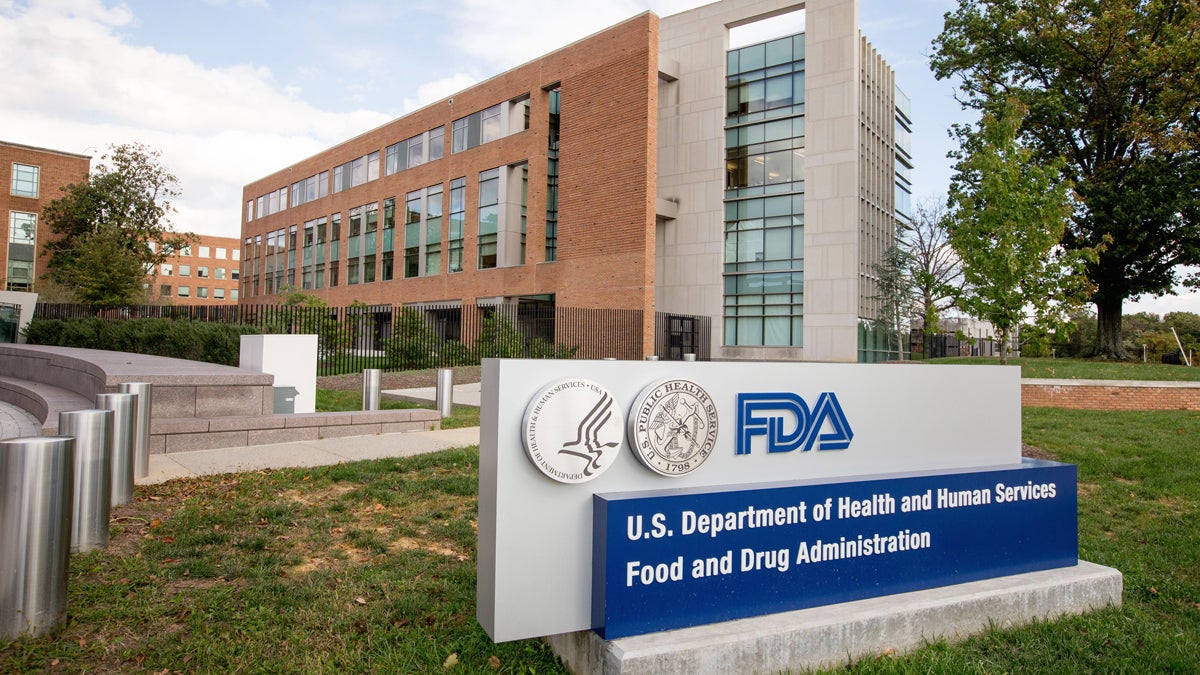‘Labeling Error’ leads South Jersey distributor to announce national FDA recall of Phenobarbital

FILE - This Oct. 14, 2015, file photo, shows the Food & Drug Administration campus in Silver Spring, Md. (Andrew Harnik/AP Photo, file)
The phrase ‘Big Pharma’ doesn’t fit Truxton, Inc., a distributor based in Bellmawr, New Jersey. The family-run company has been in business since 1957, says Paul F. Devine, who’s led the team of five employees since 1960.
Last week, a doctor contacted Devine about a mislabeled bottle of Phenobarbital, a drug prescribed to young children and pets to treat epilepsy. Several companies manufacture the drug, which is supposed to make seizures less severe, and less common.
The 15 mg bottle was filled with 30 mg pills. The labeling error prompted Devine’s company to announce a nationwide recall of a batch of 15 mg bottles.
“This mislabeled product could expose the consumer or their pet(s) to potential overdosing that can cause severe intoxication which may lead to cardiogenic shock, renal failure, coma or death,” reads the company’s announcement released by the FDA.
Devine estimates his company distributed no more than fifty bottles nationwide. “It’s only a very, very small amount of product … that’s out there,” says Devine. “How many customers were affected? So far now, we only know of one,” he said, referring to the doctor who first revealed the error.
Dr. Joshua Gagne is a professor at Harvard Medical School who studies drug safety and FDA enforcement. He says that if a patient took double the dose without knowing it, the side effects could be significant. As a sedative, the drug can be dangerous when it slows down the body too much. It slows down heart rate, and makes it more difficulty to breathe.
“If this were my son or daughter, and they had been using twice the prescribed dose, I would be concerned,” said Gagne.
Gagne cautions parents and pet owners to be careful. Though Phenobarbital is most commonly prescribed to control seizures, the federal Drug Enforcement Agency has classified it as a Schedule IV barbiturate. According to the U.S. National Library of Medicine, Phenobarbital “can be habit-forming.”
Still, Dr. Gagne says the risk of a patient overdosing is small.
“If they haven’t had any serious problems, then just going back to the regular dose should resolve the issue for them,” he said. “There shouldn’t — I wouldn’t expect there to be any long term consequences.”
For patients and pets who rely on this drug, a close examination will help them know if they have the wrong strength medication. “West-ward 450” is stamped on the 30 mg pill, and “West-ward 445” is on the 15 mg pill.
Gagne says safety of patients who rely on Phenobarbital depends on whether clinics and vets will get the word out. This nationwide recall, adds Gagne, is of one “lot” of mislabeled bottles. Yet it’s difficult to know how many bottles are in this “lot.”
Until the FDA follows up on this recall with a formal report, says Gagne, there’s no way of knowing how many bottles are affected. He says the process could take months.
With the help of officials from the FDA and the DEA, Devine sent a form letter to his customers. If a doctor purchased a 15-milligram bottle of Phenobarbital tablets, then she must report that on the form, and send the product back to the company.
“This is just the beginning,” he said. “We had to notify all of our customers who had got the product with that particular lot number. We emailed them right away, and then, we followed up with a letter. Now, they’re coming back in. That lot number is being recalled from the market.”
Devine says, other distributors could report same problem — though no other companies have filed reports about this “lot” with the FDA yet.
WHYY is your source for fact-based, in-depth journalism and information. As a nonprofit organization, we rely on financial support from readers like you. Please give today.

